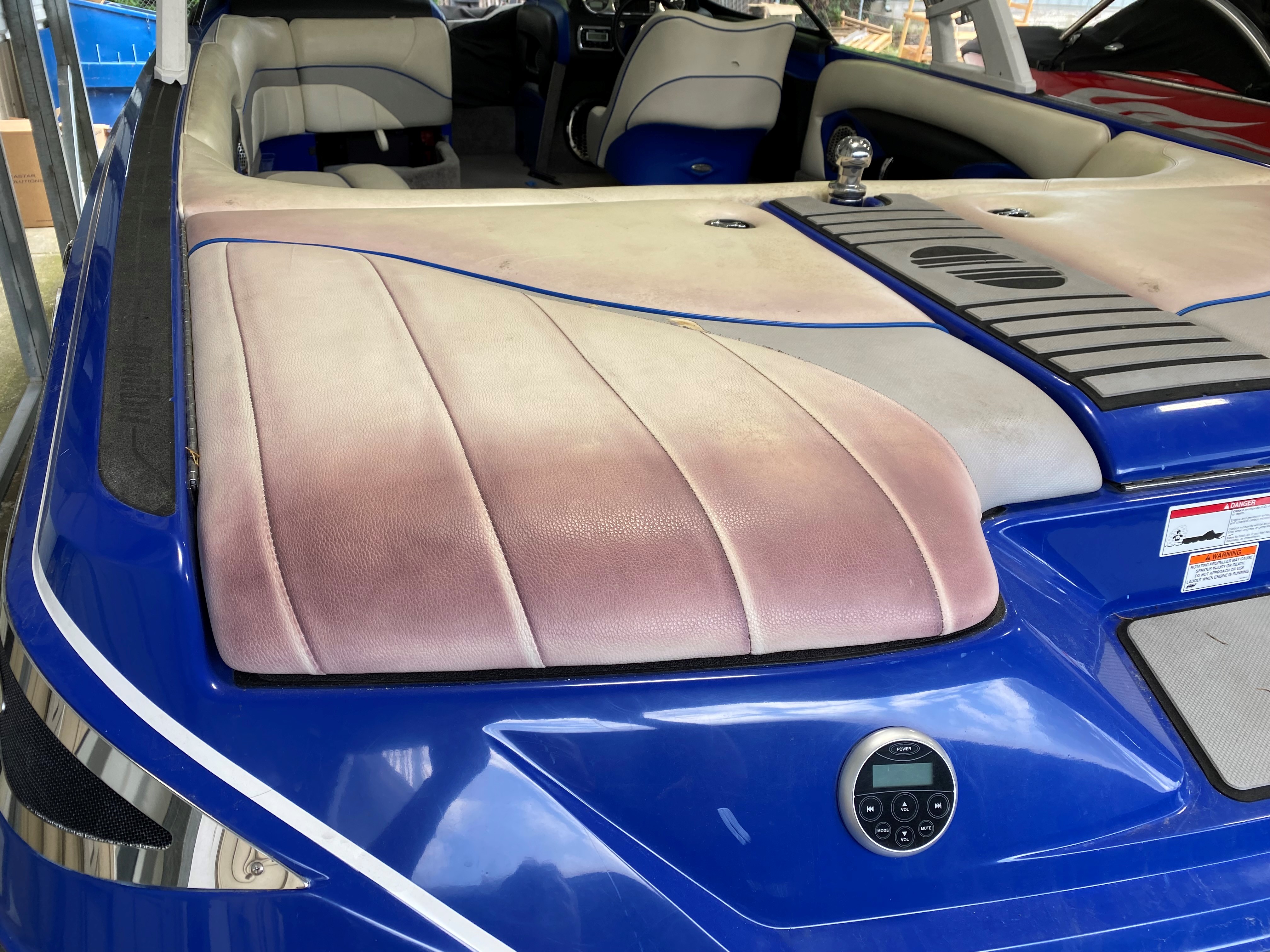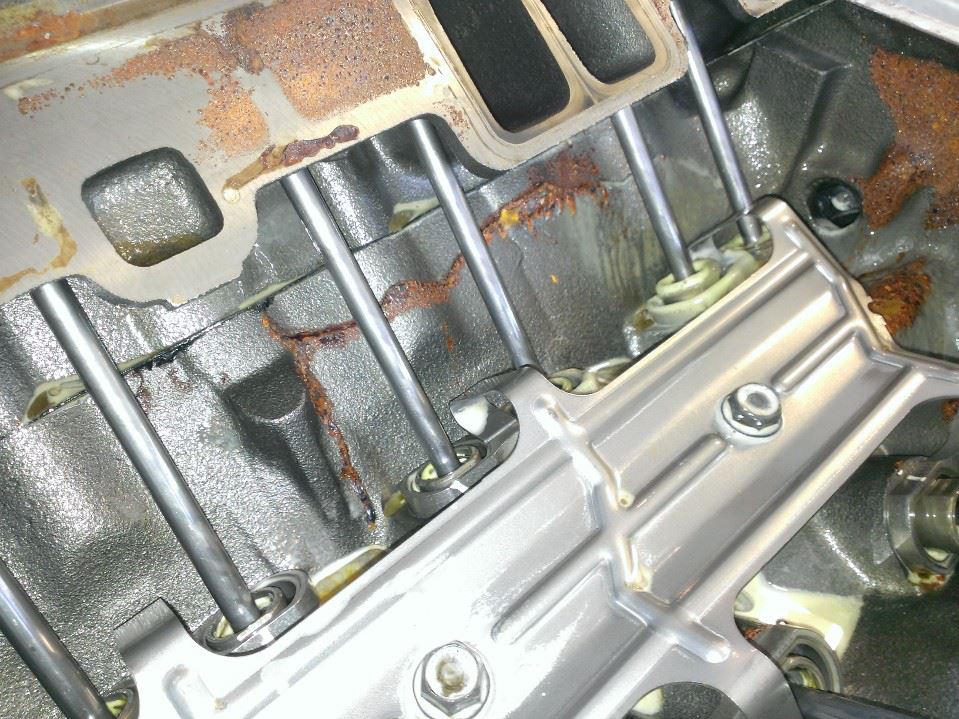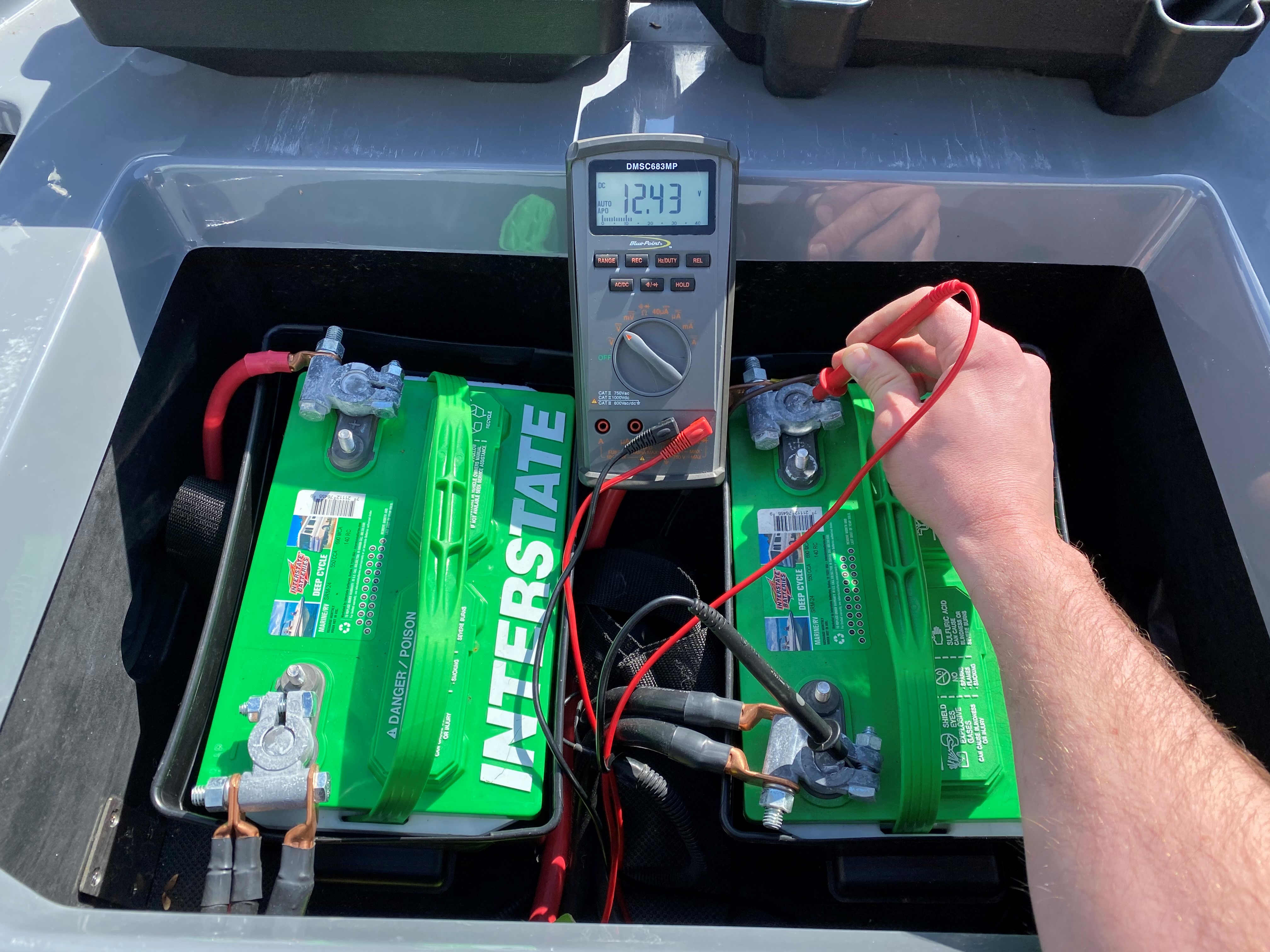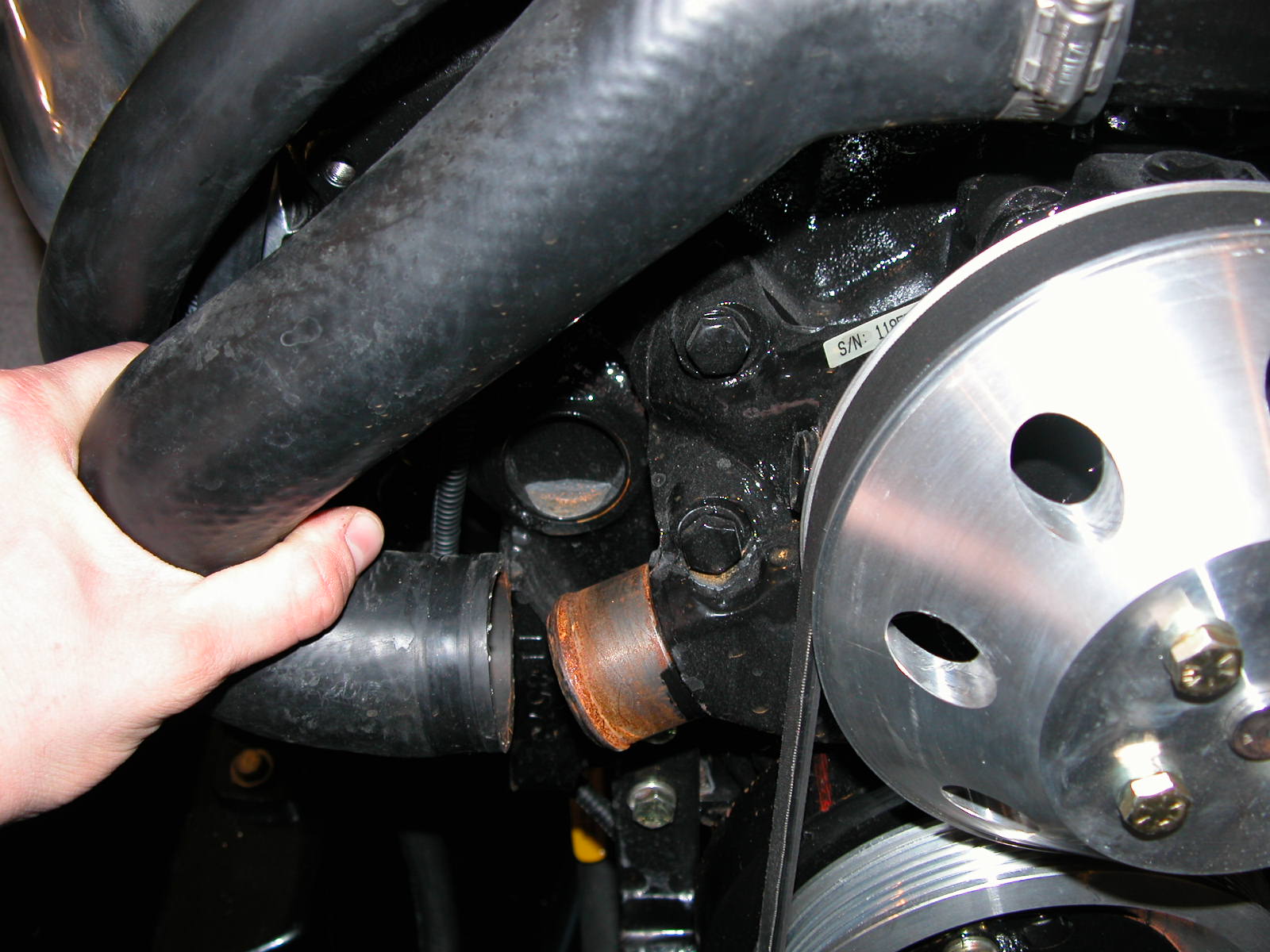Unlike some oils and chemicals that are based on automotive products, genuine Indmar oils, filters, lubricants, and vital fluids are inboard-specific products designed to meet the unique needs of towboats and watersports enthusiasts. They were established to meet the higher demands of inboard marine engines.
Blog
-
Posted: August 15, 2022Read more »
Silence may be golden, but when it comes to water sports, fun-loving captains like to amp up the good tunes. Whether your riders are pulling off basic ollies or advanced whirlybirds, their tricks will be even cooler with the soundtrack of mean guitar riffs and a thumping bass line emanating from your boat.
Getting the best tunes on the water poses some special challenges, though. Your sound system not only needs to be tough enough to stand up to Mother Nature, but powerful enough to overpower the noise of the boat motor. Because of the distance between riders and the boat, your sound system will need to really pump out the volume.
If you're wondering how to choose the best marine speakers for your boat, you've come to the right place. Here at Bakes, we've been working on, selling and riding behind performance boats for decades, so we know how important a premium audio experience is on the water.
Just Add Water
Your sound system will be exposed to the elements, so you'll want a waterproof speaker system. It's unwise to gamble with other systems just to save a few pennies. Pay close attention to manufacturers' descriptions of their speakers. Waterproof implies a higher level of protection than water-resistant, for instance.

Rain, snow and spray aren't the only hazards for marine speakers. The sun can damage speakers over time, so look for speakers that are UV-resistant, too.
One savvy way to compare speakers is to look at manufacturers' warranties. If you do your research, you may discover some warranties that extend for two or three years.
Sizing Up Speakers
Before you begin shopping, you'll also want to think about the size of the speakers you want. Generally, the bigger the speaker, the better the sound.
-
Posted: August 08, 2022Read more »
Boaters don't fret about the dog days of summer. They know the heat will make playing on and in the water even more enjoyable. If you are looking to squeeze every ounce of enjoyment out of your boat this summer, consider these must-have boating accessories from Bakes Marine.
Safety comes first for you and your crew. You'll want to make sure that you have properly fitting life vests and a first aid kit on board, as well as an air horn or whistle to signal trouble or to ward off other boats.
You'll want to provide protection for your beloved boat, too. Fenders will prevent damage from rubbing against docks and other boats. Having some tools on deck can help if there's a need to make minor repairs on the water, while a waterproof flashlight will come in handy for emergencies or routine chores in low light. Keep a fire extinguisher or two on board in case of fire.

Don't forget about electronics. At the least, you should have a GPS to help you get home even in foggy weather or at night. A VHF radio is also an important tool, as it will let you call for help in case of emergency.
Other accessories are more important to your experience within the craft. Cup holders will help keep drinks in place and off the deck and seat cushions. Cleaning tools and supplies will keep your watercraft in tip-top shape. An insulated cooler loaded with beverages, snacks and food will keep you and your crew happy throughout a long day on the water.

-
Posted: August 02, 2022Categories: Tips and TricksRead more »
Some folks out there think boating safety kills the joy of boating, but the opposite is true. The safer you make your boat, the more fun everyone can unleash on the water. Here at Bakes Marine, we're all about maximizing both safety and fun, which is why we've pulled together a list of the 10 things you need on a boat. This boating equipment list is not exhaustive, but it is a good start.
- Life vests, also known as personal flotation devices or PFDs, are a must. These vests can help prevent drowning, which is why many states legally require that passengers wear a PFD at all times. Make sure not only that you have enough life jackets on board, but that you have sizes that will fit all your passengers. Investing in comfortable life jackets will help ensure everyone wears them.
- Flotation devices like life rings or cushions can be thrown to those in distress in the water to help them stay afloat until they can be rescued.

- Keep one or more fire extinguishers on board. Although you are surrounded by water, that won't be much help if a fire breaks out in the engine compartment. A working fire extinguisher will be your best defense against onboard fire.
- Carry a boat emergency tool kit that includes a waterproof flashlight and a sharp knife, as well as tools to make on-the-water repairs.
- Have an audible signaling device. If your boat doesn't have a working horn, carry an air horn or a whistle to alert other boaters to your presence. This is especially important in foggy and low-light conditions.
- Keep a visible signaling device on board, too. The Coast Guard requires flares
-
Posted: August 02, 2022Categories: Watersports GearRead more »
The thrill and excitement of wakeboarding has attracted legions of enthusiasts and it's no wonder why. If you're interested in diving into this fast-growing water sport, make sure to check out these wakeboarding tips from Bakes Marine, the boating pros.
When it comes to wakeboarding equipment, beginners should invest in the best they can afford, particularly when it comes to boards and bindings. Many top brands, like Ronix, offer packages so that you can get everything you need with the confidence that it will perform well. High-quality gear can help you have an amazing experience on the water that will keep you coming back for more.

Safety is a crucial consideration. Every wakeboarder should have and wear a U.S. Coast Guard-approved life vest - in some places, wearing a life vest is even a legal requirement. Nowadays, life vests are designed with performance in mind, so there are lots of stylish and comfortable options for keeping your crew safe on the water.

Once you've got your gear, it's time to find your footing, literally. Be prepared to wipe out - at first, it'll take some time to find your balance, just like with riding a bike. Try and try again, and your endurance, balance and performance will improve.
Simply standing up on the board can be a challenge for first-timers, so make sure you've decided how you will position your feet. Your dominant foot should be positioned at the rear of the board, with your weaker foot in front. In wakeboarding, riding with the right foot back is called regular, while riding with the
-
Posted: July 11, 2021Categories: UpholsteryRead more »
Seats turning brown, vinyl pinking or vinyl discoloration has become a very common issue across the marine industry. The phenomenon perplexes many boat owners fearing they ruined their boat upholstery when in fact sometimes all it takes is 30-6o minutes in direct sunlight to make it disappear. The reaction to creating the stains only happens when the boat is exposed to a humid and hot environment at the same time. Boaters struggle with his issue since boats are always wet from normal use then they cover the boat up to protect it from the elements creating the perfect greenhouse environment for pinking to do its thing when things heat up. Marine Fabricator released a great article to explain the science behind vinyl discoloration to help boaters understand more how it happens and how to prevent it.
To sum it up, this is no new phenomenon to Glen Raven and Spradling Marine the two worlds largest marine upholstery suppliers. PVC discoloration has been a problem since the '80s and will certainly be an issue in the future. Here are a few tips Bakes can give to avoid the issue from happening:
- Only Clean your upholstery with factory approved cleaners such as 303 Multi-Surface Cleaner (absolutely no household cleaners, simple green, etc)
- Condition your upholstery with 303 Vinyl Conditioner often to prevent UV degradation
- Use proper Boat Covers made specifically for your boat and ensure they have a Vent in the cover at a high point.
- Avoid having boat covered in direct sunlight
-
Posted: April 14, 2021Categories: EngineRead more »
Over this past 2020-2021 winter, many boaters may have experienced deep freezes in areas that normally do not experience these conditions. The extreme cold weather along with power outages may have caused catastrophic damage. To make sure your boat is up and running for this season, we would strongly suggest any boat exposed to freeze damage be fully inspected as soon as possible. It may be necessary to run the engine longer than typical to go through temperature cycles before damage is fully recognized. Sometimes the damage may have occurred, but symptoms may not be present at first. Multiple operating cycles may be necessary to fully inspect for damage. Ensure that you inspect the engine oil, oil cooler, transmission cooler, and fluid. Be sure to also check the v-drive fluid. Inspect engines with freshwater systems as well. If the antifreeze protection level was not maintained, the damage could be done to this system as well. Be sure to relay this information to any customer who may have been taking care of their own winterizations.
Engine manufactures are facing long lead times from various suppliers, which could slow your return time to the water. Early detection of freeze damage will help identify needed parts and help get your boat back on the water earlier. -
Posted: February 22, 2021Categories: How to Fix & DiagnoseRead more »
Electrical Troubleshooting 101
Troubleshooting electrical problems in your boat can be a frustrating task, but it does not have to be if you keep a few simple rules in mind: Every circuit needs a power source; most electrical devices require a minimum voltage to function correctly, and all circuits require continuity. Consequently, most electrical problems are caused by low voltage (or no voltage), excessive resistance, or a loss of continuity.
1. What is the battery voltage?
Check battery voltage directly at the battery terminals. A fully charged battery should show around 12.5-12.7 volts. Perform a load test with a battery load tester to make sure there is not a bad or week cell in the battery.2. Have you loosened, wiggled, and re-tightened the battery cables at the battery and engine?
Even though a battery cable connection may seem tight or clean, corrosion or even paint can cause a bad connection and can cause a loss of power or ground when put under a load. It's also a good idea to fully remove cables and clean connections.3. Have you checked the positive and ground cables at the breaker panel bus bar?
Be sure these connections are tight and also clean. Loosen the connections and re-tighten to ensure a good connection. They may appear tight because they are wire-tied snug but may be loose at the connection.4. Have you checked the corresponding breaker at the breaker panel?
The breaker may appear as though it is not tripped but may actually be bad. Remove the breaker and perform a continuity test. Also, check the connections/sockets in the breaker panel. Some connections can become loose and make poor contact causing the contacts to arc and have an intermittent connection or loose connection altogether.5. Have you checked for power and ground at the corresponding PDM?
Check the red and black wires that plug -
Posted: December 03, 2020Categories: EngineRead more »
Inboard Winter Storage Do’s and Don’ts
There are two important reasons to winterize your boat, preparing for long periods of inactivity and being proactive in protecting your investment from damage. Winterizing is preventive maintenance that is necessary for your boat’s survival not only in the winter months but in the summer months as well. Below are some helpful tips to protecting your valuable recreational asset during the off-season.
Give It a Full Tank of Fuel or Empty it
In the perfect world, you want no fuel in the tank but that is difficult to achieve sometimes. Bakes recommends adding a fuel stabilizer and fill your boat's fuel tank with premium, prior to stowing it away for the winter. Failing to do so will allow moisture in the air to condense on the sides of the fuel tank as the temperature changes causing water contamination in your fuel while the boat is stored.Change Your Fluids!
It is crucial to your engine's health to replace your engine's fluids and filters. This will eliminate the chance for moisture and contaminate separation from the system while it sits and provides better overall protection for key internal parts. Do not forget your transmission ATF fluid, it is easy for moisture to get in the transmission from its open vent system mounted so low in the bilge. Swap out your transmission’s fluid with fresh to avoid the chance of corroded clutches and sticky gears. If your boat is equippe -
Posted: October 13, 2020Categories: EngineRead more »
Genuine Indmar service products are crafted with the same world-class standards and developed through the same performance and durability testing as your Indmar Marine Engine. Protect and optimize the performance of your Indmar with service products that were engineered specifically for it.
Compared to cars, tow-sport specific inboard marine engines produce more low-end torque per displacement at lower RPMs and have different cooling systems than that of an automobile. Everything that Indmar offers from propylene glycol antifreeze, transmission fluid, synthetic oil, blended oils, filters, fuel treatment, and other vital fluids is formulated to be the very best inboard marine engine products you can buy.
All Indmar service products are in-stock at Bakes Marine and ready to ship.











